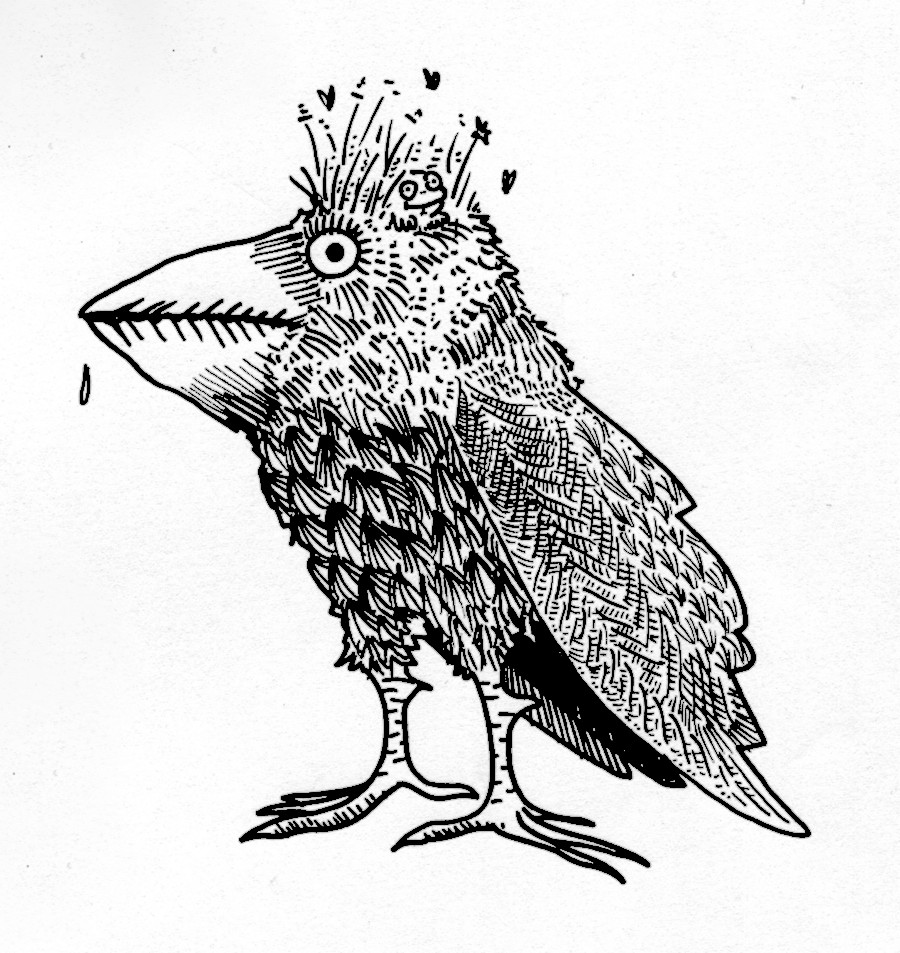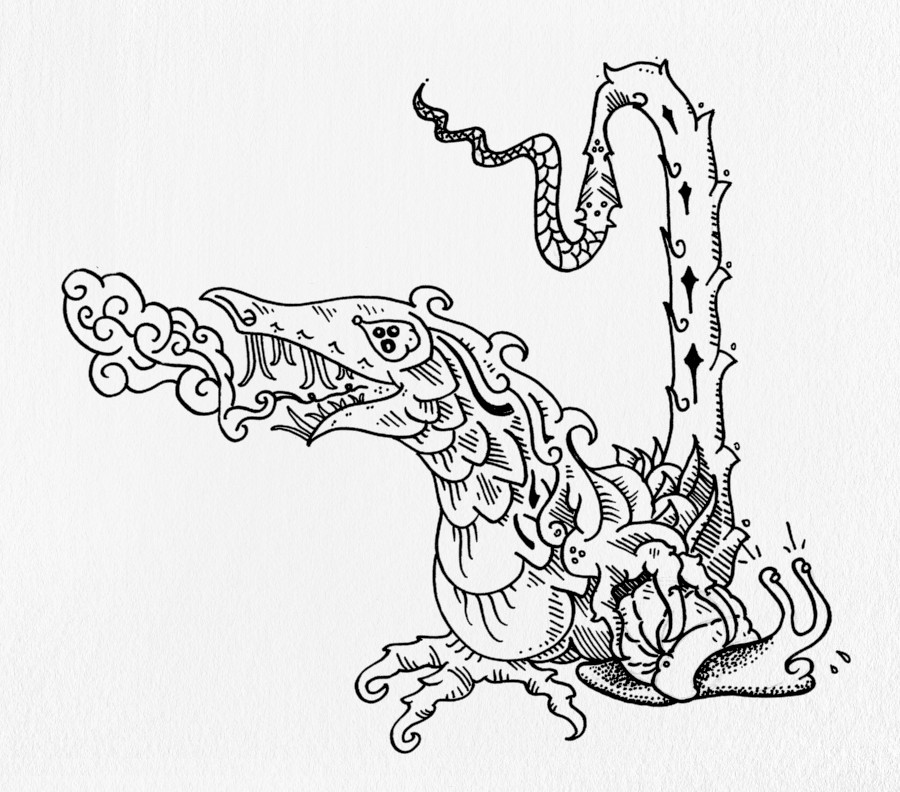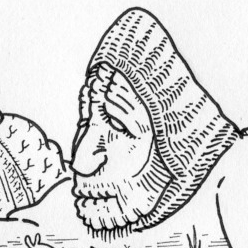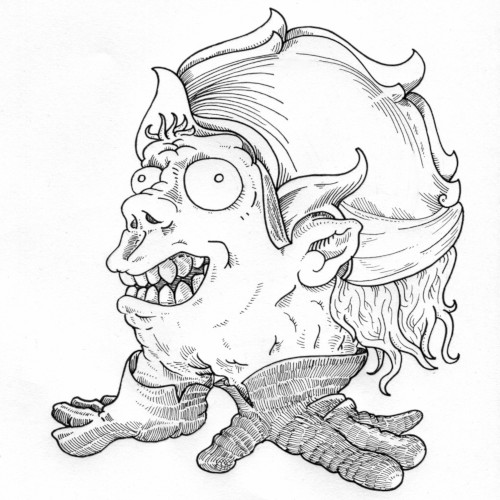
The tale of
Alod & Wylder
Many stories abound in Bos, like myriad leaves in a forest they whisper, fall down and grow anew.
This metaphorical tale is part of the Wylder-Cycle, popular among patricians and common folk alike.
Original version in Bossprauekke
Disdir in’ Glam° – wār op zýn Weegge
Eng ýy zāgge dor – al bý dèn Kroottemeerre°
Dinst’re Wylder – Man vèr Swartseege°
Dý stoet al knielt – wroedde te bēdde
Bý d’Sgoonste vang t’Lendt – Alod dý Feerre
Disdir in’Glam – zýn Trots in Dreege
Strèk hooge et Veen – rýppe ten Kamp
Wylder tèng sprauekke – ang Alod èn Loft
“Wērre sal’k dý – eng akssen dýs Keettes°”
Deng Disdir in’Glam – am Sweeret bedrē
Hivve ang mit Magtte – te wērre stoengt
Dinst’re Wylder – sýn Lontte° ing Hènnet
Dèr wārt Kryg – dèr wārt Dödschlag
Sý stakke eng sloegge – twērre èn wàr Schlag°
Wylder dýn zwegtte – van d’Bludde° gekwē
Ýy zāgge zýn Loorre – ang t’Engge vèng Dag
Alod dý Feerre – mèng anggete Krys
Nam Wylder ing Hènnede – Vor zýn enggeste wortte
“Dýn Eerre k’hat wērret – eng nù d’es Vroey°”
Ýy zwýggte dan – eng stýrvvete ing Kwyntte°
English translation
Radiant Disdir° – was on his way*
And there he saw – beside the Kroottemeerre°*
Dim Wylder – the man from Swartseege°*
Who had knelt down – beseeching
The most beautiful of the land – Alod the Fair
Radiant Disdir – his pride threatened
Raised his banner – called to fight
Wylder then spoke – a promise to Alod
“Defend you I will – and sever these chains°”
Then Radiant Disdir – skillful with sword
Commenced with force – and in defence
Stood Dim Wylder – mace in hand°*
There was combat – there was death
They stabbed and slashed – a veritable battle°
Wylder yielded – exhausted from bleeding°
He saw his defeat – by the end of the day
Alod the Fair – with a frightened cry
Took Wylder in her arms – for his last words
“Your honor have I defended – and now you are free°”
Then he was quiet – and died in silence°
Dutch translation
Glitterende Disdir° – was op zijn weg
En zag aldaar – by de Kroottemeerre°
Duistere Wijlder – de man van Swartseege°
Die zat geknield – verwoed te smeken
Bij de mooiste van t land – Alod de Schoone
Glinsterende Disdir, zijn trots bedreigd
Stak hoog zijn vaandel – riep op tot gevecht
Wijlder sprak toen – een belofte aan Alod
“Ik zal jou verdedigen – en deze ketens° splijten”
Toen, Glinsterende Disdir – bedreven met het zwaard
Hief aan met macht – ter verdediging stond
Duistere Wijlder – zijn knots° in d’hand
Er was strijd – er was doodslag
Zij staken en sloegen – ‘t werd een ware veldslag°
Wijlder zwichtte – uitgeput van ‘t bloeden°
Hij zag zijn verlies – aan ‘t eind van de dag
Alod de Mooie – met een angstige schreeuw
Nam Wijlder ter hande – voor zijn laatste woorden
“Jouw eer heb ik verdedigd – en nu ben je vrij°”
Toen zweeg hij – en stierf in stilte°
Notes
Disdir in’Glam — Disdir is said to symbolize the blinding pride and ambition of the aristocracy, while Alod represents the innate freedom of the world (and not wealth or power as some presume). Only Wyder has dialogue, Alod lets out a single scream while Disdir is silent throughout; he speaks through brash actions, but does not think.
Kroottemeerre — A type of tree that is presumed to be immortal. These trees can survive for untold centuries and seem to revive themselves every so often; when they are raveged by rot, lightning strike or drought, they will spring new leaves after several years, or even decades. They seem to be connected to the Woelddevolxke – the wild men of the forest and it is this same tree that is featured in the folkloric tale of Decklep & Katzenfloeperd.
Dinst’re Wylder van Swartseege — Swartseege is the collective name for those communal societies in the independent/frontier regions of Bos. Wylder, who is never officially knighted (‘Ruyterred‘) is the symbol of nobility and persistence that is shown by the inhabitants and defenders of these honorable communities.
note 1: even an independent farmer with no loans or fealties can be considered a part of Swartseege
note 2: Swartseege means as much as ‘Black Blessing’ in reference to the black banners these communities display when they act in unison. See also: Swartflagges
Keettes — Chains. He does not break the chains, but sevvers them, with the Aksse (‘axe’), the popular weapon of thecommon folk, a tool every freeman has at hand, no matter their wealth. Wylder is not breaking Alods chains, rather the vicious cycle of conflict and violence that seems to haunt him.
From Dutch: keten, ‘chain’.
Lontte — This word is an anachronism. The Lontte is a relatively recent weapon; probably it replaced another word that closely resembled spelling/pronunciation, such as *’Looggent’* which is an out-of-use farming tool that could be used as a halberd. The Lontte is a tool/weapon used by cannoneers; a heavy cast-iron mace with hooks that allow it to be coiled by a fuse.
From Dutch: *lont*, ‘fuse’.
Schlag — Battle as in large scale conflict. Normally *Kamp* is used to describe a tournament, skirmish or clash of modest proportions, *Schlag* meanwhile refers to the large-scale pitched battles fought in all-out war.
From German: Schlag, ‘blow, strike’
Bludde — Blood, the bleeding disintegration of independence. It is exhaustion of bleeding from many cuts, not the severity of his wounds (even if they were serious enough) that spells defeat for the shadow knight.
From Dutch: bloed, ‘blood’
Kwyntte — Wylders’ death in silence: Swartseege still exists but is marginalized and has not expanded noticeably in many years even if the Landde- and Bergge communities are strong (more on those later). Swartseege was/is the Utopian progenitor of more realist heirs of freedom.






